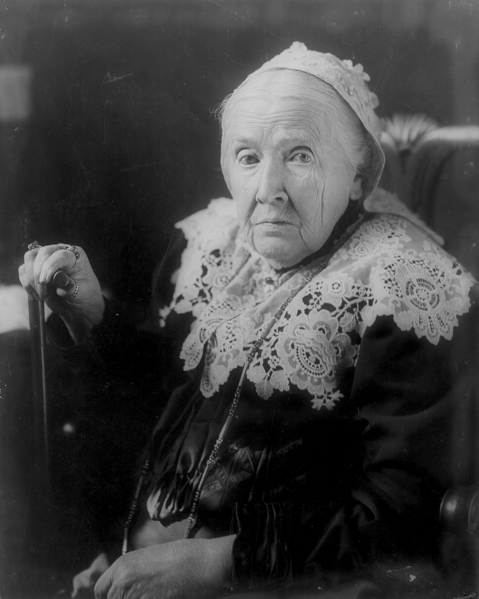This is for writers who use their pens as their swords, for those who battle monsters with poetry, for those who seek to use their words to do good in the world: this collection of encouraging mind-food is for you.
Hail our mother warrior-poets! Hail our sisters in spirit!
1. “I shall stick to my resolution of writing always what I think no matter whom it offends.”
Julia Ward Howe, 1819-1910: abolitionist, activist and poet.
Ms. Howe is best known as the author of The Battle Hymn of the Republic, an anthem written in the midst of the American Civil War. Her early activism was inhibited by a disapproving husband, but she eventually became a much-admired figure of the women’s suffrage movement.
2. “I wrote what I did because as a woman, as a mother, I was oppressed and broken-hearted with the sorrows and injustice I saw…because as a Christian I felt the dishonor to Christianity…because as a lover of my country I trembled at the coming day of wrath.”
Harriet Beecher Stowe, 1811- 1896: abolitionist and novelist.
Ms. Stowe is the author of the infamous anti-slavery novel, Uncle Tom’s Cabin, which has been sparking fierce controversy since its first publication in 1852. President Abraham Lincoln allegedly called her “the little woman who wrote the book that made this great war.” Her book remains on a number of banned book lists, even in 2015.
3. “Deliver me from writers who say the way they live doesn’t matter. I’m not sure a bad person can write a good book. If art doesn’t make us better, then what on earth is it for.”
Alice Walker, born 1944: Pulitzer Prize-winning novelist and political activist.
Ms. Walker is best known for her novel, The Color Purple. Born to African American sharecroppers in the Jim Crow South, Ms. Walker’s family insisted she go to school instead of working in the fields. She went on to excel academically and gift the world with powerful stories.
4. “Writing saved me from the sin and inconvenience of violence.” ~ Alice Walker
Here’s Walker, hitting the proverbial nail on its proverbial head once more. For the socially-conscious poet, writing is a powerful, natural and healthy outlet to the rage sometimes evoked by blatant acts of injustice in the world.
5. “Artists have a responsibility to speak and to act when governments fail, and if we don’t do that, we really deserve the world we get.” ~ Alice Walker
Walker has so many wonderful quotes that it proved difficult to choose just one. Or two. Or three. Perhaps this is why she’s an award-winning author.
6. “It is my mission to help in the breaking down of classes, and to make all men feel as if they were brethren of the same family, sharing the same rights, the same capabilities, and the same responsibilities. While my hand can hold a pen, I will use it to this end; and while my brain can earn a dollar, I will devote it to this end.”
– Lydia Maria Child, 1802-1880: abolitionist, women’s rights activist, Native American rights activist, novelist and journalist.
Ms. Child gave us some of our most familiar rhymes, such as “Over the river and through the wood, to Grandmother’s house we go.” But she also wrote stories challenging white supremacy and men’s right to control society; these pieces often shocked readers who were accustomed to her cozy writings about homey topics.
7. “If you have knowledge, let others light their candles in it.”
Margaret Fuller, 1810 – 1850: journalist, book critic, and women’s rights advocate.
Ms. Fuller is remembered as the author of the first major book of feminist theory in the United States: Woman in the Nineteenth Century, published in 1845. Many contemporaries took offense to her words, but others, such as Henry David Thoreau, appreciated her Transcendentalist style and raved about the work.
8. “Of writing many books there is no end; and I who have written much in prose and verse for others’ uses, will write now for mine—will write my story for my better self.”
Elizabeth Barrett Browning, 1806 – 1861: abolitionist and poet.
Ms. Browning was very ill for much of her life, but that did not stop her from becoming one of the most widely-read poets of her era. Although she is best known for her love sonnets, she also penned two impassioned, highly-circulated poem-stories for the cause of abolition. Born into a British family with extensive connections to slavery, her activism endangered her own economic well-being and made her a rebel in her own household.
9. “If there’s a book you really want to read, but it hasn’t been written yet, then you must write it.”
Toni Morrison, born 1931: novelist, editor and university professor.
Ms. Morrison has won just about every book award for which an American author is eligible. Her most popular and acclaimed novel is Beloved. In addition to writing her own potent stories, she has used her know-how as an editor to support other writers and bring African American literature into the common canon.
10. “Good writing takes place at intersections, at what you might call knots, at places where the society is snarled or knotted up.”
Margaret Atwood, born 1939: novelist, poet, literary critic and environmental activist.
A child of the Canadian forest, Ms. Atwood’s best-known work is her dystopian novel, The Handmaid’s Tale.
Have you found other quotes to kindle the soul of the activist poet?
I’d love to read them. Post them in the comments section following this article!
~
Relephant Reads:
Write that F***ing Book!
What does it Mean to be Mindful in a Cruel World?
~
Author: Katie-Anne Laulumets
Editor: Alli Sarazen
Photo: Julia Ward Howe circa 1909. Library of Congress via Wikimedia Commons.











Read 1 comment and reply